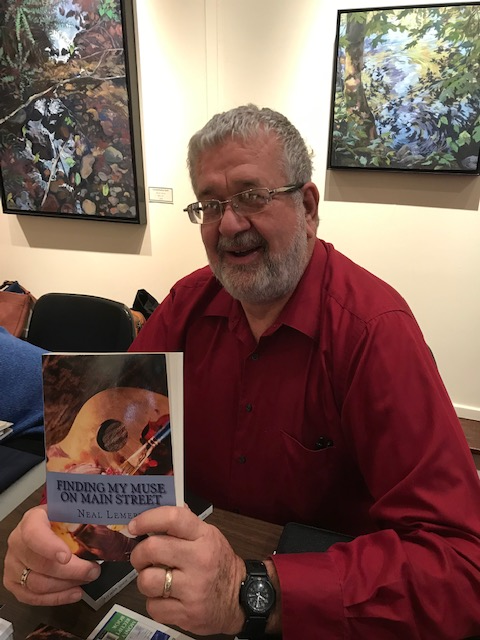A well-known face to many in Tillamook is Neal Lemery – some may have met him in his role as Justice of the Peace and Tillamook municipal court judge during the past decade, or now as the “community volunteer”, a board member for the Library, Master Gardeners, Fairview Grange and Art Accelerated. Lemery has always taken an active role in his community and is a renaissance man with many interests. With his retirement half a dozen years ago, Neal found the time to explore his many interests, including writing and has authored three books and many articles and blogs which he generously shares with many audiences. While chatting one day, he mentioned in an offhanded way, “Well that was after my heart attack.”
With February being “heart” month, and Tillamook County Wellness focus on sharing community members’ health behavior change stories, we asked Neal to tell us more about his wellness wake up call.
As Neal explained, being a lawyer and judge is known to be a high stress occupation, and while he was aware of the impacts, he wasn’t always proactive about making changes. In early 2011, he was experiencing extreme back pain, after several days, a lot of ibuprofen and it wasn’t getting better, his wife insisted that he go see his doctor. Grudgingly, Lemery headed to see Dr. B (Dr. Paul Betlinski at the Tillamook County Health Centers). Waiting patiently, Dr. B came out and asked why he was there and quickly assessed Lemery was having a heart attack. “Looking back now, it was all very surreal,” explained Lemery. “On the ambulance ride to Portland, I was very calm, ‘okay, so this is it.’ I thought.” Lemery’s father had died from a heart attack, and not known to him at the time, on the same day years earlier, as Neal’s ambulance ride. “What a coincidence, right?” commented Lemery.
Before his heart attack, Lemery explains that he was aware of healthy eating, but it wasn’t a focus, and exercise was something he did “sometimes.”
Fortunately for Neal, his heart procedure was successful, but the life-changing part came from a “heart-to-heart” with the cardiac nurse in the ICU, “She told me, lectured me, that I was being given another chance but it was up to me to have the right attitude and a desire to live,” explained Lemery. “I decided right then to make some changes and it wasn’t that drastic. Eat better and walking, take my medication – I was stunned when my cardiologist explained that over half of heart patients don’t take their meds.”
Lemery’s new lease on life had its challenges. About nine months after his surgery and during his healing process he wrote out his step-by-step guide on “How to be a Good Heart Patient.” He shares his ups and downs – “The depression can kill you,” he said, “The mind-body connection is amazing.” Describing himself as a “Zen Druid”, Lemery said that his time spent in nature, and as a creature of the earth were especially healing, to provide a healthy view to live life to the fullest.
“That’s why the work of Tillamook County Wellness fits for me,” said Lemery. “I’m always preaching the gospel about a positive mental attitude and an intentional desire for the important things, like family, friends and good health. I’ve become kind of an evangelist about this,” he chuckled.
Here an edited version of Neal Lemery’s “How to be a Good Heart Patient.”
- Be involved in your care. Ask questions during your doctor’s visit. Understand your diagnosis. Understand the medication strategy, the exercise strategy, the dynamics of the treatment.
- Be organized with your medication – use a pill-reminder with a copy of your meds list (printed out by your doctor) on the inside door of the cabinet you keep all your pill bottles and your pill box. Understand your meds. Knowing WHY you take a med is essential to engage your mental process into healing. Some meds need to be taken with food. Read all the info about your meds and the side effects. You WILL have side effects from some of the meds. Knowing that will ease your anxiety when you do experience the side effect.
- Adopt the mindset that all your food is medication for your body.Ask yourself if what you are putting in your mouth is nurturing your body.
- Keep a log book. Writing things down makes you more aware and focused on healing and getting stronger. It creates a self-reward system.
- Be systematic with exercise. Be aware of your body. Muscles strengthen by being used. Your body will tell you a lot. Treat yourself to special exercise clothes.
- Eat Mindfully. If the body is lacking in something, you may find yourself drawn to foods with that nutrient. Notice “cravings” and why you might be getting them. A mug of wild sweet orange tea in the evening, with a bit of honey, is my dessert.
- Have a support team. You, your log book, your spouse. Informally, I had a few friends and work acquaintances who had heart issues around the same time, and we’d connect with each other, occasionally having coffee.
- You will experience sudden, intense spurts of depression. It is part of the recovery from trauma. This will pass. Work through it. Exercise helps. Let your spouse know this is a natural phenomenon and that you are aware of it.
- Seize life. Life is precious. Do what you want to do. Don’t put it off. After my heart attack, I realized I wanted to go to California to see my foster son and his new house. So, six weeks later, I went. A reward for doing my fitness and nutrition regimen.
- I’ve found I’m a bit more blunt, and a lot more into doing things now and not “later”. So, I don’t do stuff I really don’t care to do anymore. Its liberating.

